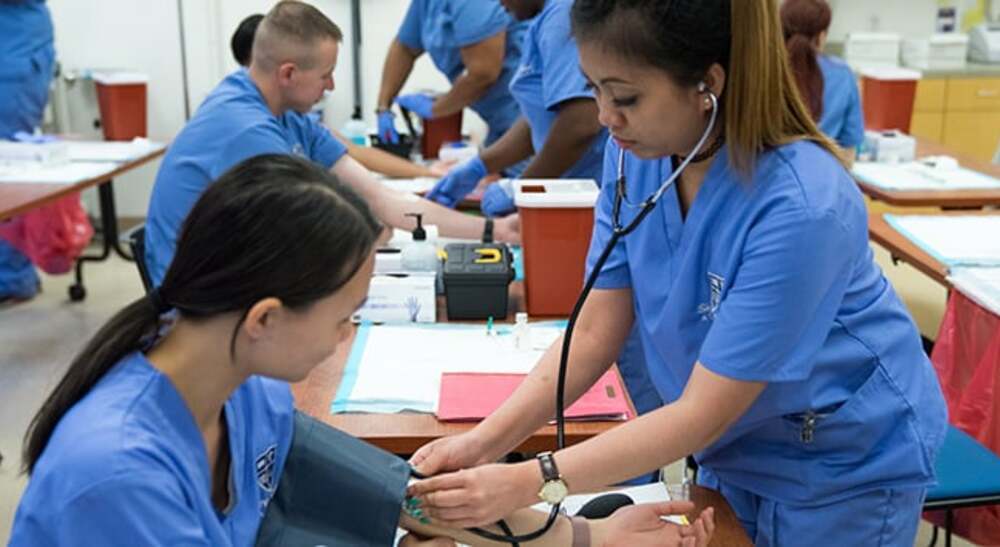Northeast Medical Institute CNA Training Stamford: Professional Direction for Aspiring CNAs
Northeast Medical Institute CNA Training Stamford: Professional Direction for Aspiring CNAs
Blog Article
Essential Factors to Take Into Consideration When Picking the Most Ideal Medical College Curriculum for You
Selecting one of the most suitable medical institution educational program is a critical decision that can substantially influence your instructional trip and future profession path. As striving physician, the choice of curriculum must line up with your individual discovering style and career ambitions. Nonetheless, past these first considerations, different critical elements enter play when making this option. By exploring the subtleties of mentor methodologies, educational program versatility, and clinical direct exposure possibilities, a much more detailed understanding of what makes a curriculum appropriate for you emerges. Allow's explore these essential aspects that can form your medical education and eventually, your professional trajectory.
Personal Discovering Design

Medical institutions that provide diverse mentor methods and resources can fit numerous learning styles, promoting a comprehensive and vibrant academic setting. Ultimately, comprehending individual learning choices encourages pupils to make educated choices regarding their clinical education, establishing a solid foundation for their future careers in health care.
Occupation Objectives Positioning

Moreover, lining up career purposes with the clinical institution curriculum can likewise enhance motivation and engagement throughout the instructional trip. They are a lot more likely to remain concentrated and committed to their research studies when trainees see the direct significance of their coursework to their future profession. Therefore, when choosing a clinical college educational program, it is critical to carefully take into consideration how well it aligns with one's occupation purposes to make certain an effective and fulfilling expert course.
Teaching Approaches
Considering the alignment of career purposes with the selected clinical institution educational program, an exam of the training methodologies employed becomes crucial in forming the learning experience. The efficiency of a clinical institution educational program greatly relies on the mentor methods made use of by the organization. Numerous teaching approaches, such as lectures, small group discussions, problem-based learning, simulation-based training, and hands-on clinical experience, can dramatically affect just how well pupils keep and comprehend details.
Lectures are a standard yet still typically utilized method for supplying web content to a large team of students efficiently. Tiny seminar foster collaboration, crucial reasoning, and communication abilities amongst pupils. Problem-based knowing encourages energetic participation, self-directed learning, and problem-solving capabilities. Simulation-based training allows trainees to exercise medical skills in a regulated setting before engaging with genuine people. Hands-on clinical experience uses a direct understanding of client care and medical practices.
When selecting a clinical institution educational program, aiming pupils should think about the training methodologies utilized to make sure that their understanding preferences and toughness align with the academic method of the establishment.
Educational Program Versatility
When assessing clinical college programs, assessing the extent of curriculum adaptability is essential for prospective students looking for a customized educational experience. Educational their explanation program adaptability describes the level to which pupils can individualize their discovering paths within the clinical school educational program. An educational program that supplies adaptability enables students to pursue their interests, focus on areas where they need a lot more assistance, and involve in discovering experiences that align with their job objectives.

Possible medical trainees need to consider exactly how a clinical college's educational program adaptability aligns with their understanding choices, profession desires, and personal goals. By selecting a program that provides the appropriate equilibrium of framework and flexibility, students can optimize their academic experience and prepare themselves for effective professions in medicine.
Scientific Exposure Opportunities
Discovering the useful application of clinical expertise, scientific direct exposure possibilities play a crucial duty fit a detailed clinical education. These opportunities give trainees with important hands-on experience in real healthcare setups, enabling them to connect the gap in between theory and method. When considering medical institution curricula, the top quality and amount of scientific exposure need to be very carefully reviewed.
Efficient medical exposure should use a diverse variety of experiences across numerous specialties, ensuring that pupils are revealed to different medical scenarios and individual demographics. Direct exposure to outpatient centers, inpatient wards, surgical cinemas, and emergency departments can help students develop a well-rounded understanding of various facets of healthcare delivery. Furthermore, opportunities for community-based treatment and interactions with underserved populations can click over here now promote a deeper appreciation for the social components of health.
Additionally, the presence of helpful professors and advisors throughout these clinical experiences can significantly boost the discovering procedure. Professors guidance and useful comments can assist trainees mirror on their clinical experiences, identify areas for renovation, and enhance their medical skills and decision-making capabilities (Northeast Medical Institute CNA Classes Near me Stamford). On the whole, durable scientific direct exposure chances are crucial for preparing future physicians to supply top quality client treatment efficiently
Conclusion
In final thought, when choosing a medical institution curriculum, it is important to consider your informative post individual knowing design, alignment with career purposes, teaching methodologies, curriculum versatility, and scientific direct exposure possibilities. These variables play an important duty in figuring out one of the most appropriate program for your instructional and professional growth. See to it to thoroughly review each facet to make an educated choice that will best sustain your development in the clinical area.
Comprehending one's individual learning style is critical when choosing a medical institution curriculum. By determining one's discovering style early on, striving medical trainees can strategically select a curriculum that caters to their staminas, ultimately enhancing their discovering experience and scholastic success.
When examining clinical school programs, evaluating the degree of educational program flexibility is important for prospective pupils seeking a customized instructional experience. Curriculum flexibility refers to the degree to which pupils can personalize their learning courses within the medical college curriculum.In final thought, when choosing a medical college curriculum, it is important to consider your personal knowing style, alignment with job purposes, showing methodologies, curriculum adaptability, and medical direct exposure opportunities.
Report this page